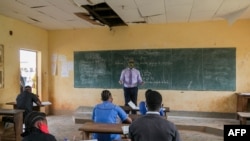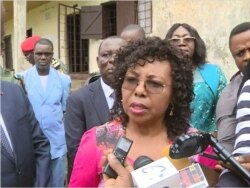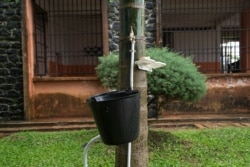More than seven million Cameroon children and their teachers have returned to schools for the first time since their institutions were closed to stop the spread of COVID-19, seven months ago. The government of the central African state says it has been able to considerably reduce the spread of the disease that has been officially confirmed in more than 20,000 people with 420 deaths. Respect of COVID-19 barrier measures is imperative in all schools.
The oldest student reads rules and regulations to be respected at Government Bilingual High School Essos in Cameroon’s capital Yaoundé. The school’s administration reports that 1,000 students answered present on day one of the 2020/2021 school year. Among them is 13-year-old form two student Treasure Monyuy. Monyuy says students have new guidelines to follow.
"They [teachers] say that we have to wear our masks. We have to be washing our hands every time. My friends are happy to go to school. I am happy to go to school because I have been in the house for a long time and I am also happy to see my friend," said Monyuy.
The Cameroon ministries of Basic and Secondary Education report that at least seven million children attended classes all over the country. Donald Abega, a pedagogic inspector says he and his peers were deployed to towns and villages to educate students and teachers about following COVID-19 prevention measures. He spoke via telephone from the northern town of Garoua.
"We started already by having an in-service training on preventive measures and how to teach during the COVID times and also sharing materials online on how we can curb the virus in schools. Also, we have provided handwash stations and also sensitized the parents, so the parents need to get for the learners face masks while we in school provide handwashing stations as well as hand sanitizers," said Garoua.
Nalova Lyonga, Cameroon minister of Secondary Education says schools have been provided with water and face masks, which are obligatory. She says a maximum of 50 students will be admitted per classroom and a double shift system will be introduced in schools which have more than 50 children per class. She says where there are more than 50 students registered per class, the first group of students will attend classes from 7 a.m. to 12 noon while the second group begins from 1 p.m. and ends at 5 p.m.
Lyonga says the government is also experimenting with e-learning to stop the spread of COVID-19 especially in towns where student enrollment is very high.
"I plead to the parents and to the public that please join us in using distance education to beat a disease that we have never seen before. In fact, we have the tablets onto which courses are going to be recorded. Any student can take the tablet home and read the lessons and then bring it back just like you would do in a library when you are taking out a book," she said.
Cameroon closed all its schools on March 17, 12 days after the central African state reported the first case of COVID-19. In July, the government announced that deaths from COVID-19 were declining. Etoundi Mballa, director of epidemics and pandemics in Cameroon’s Health Ministry says he proposed that schools should reopen when he noticed a reduction in COVID-19 infections.
He says Cameroon has noticed that the preventive measures the government took to stop the spread of COVID-19 are paying off. He says infections and COVID related deaths have been reduced drastically. He says medical staff members are, however, cautioning against abandoning barrier measures against COVID-19 because a reduction in spread does not mean that the coronavirus has been conquered.
Mballa said health teams have been mobilized to intervene should there be any suspected case of COVID in any school throughout the country.
Cameroon reports that it has registered 20,924 COVID-19 cases since the first case was diagnosed on March 5. Close to 300 of the 420 deaths are people above 60.






